US Election 2020: Meet the voters behind Bloomberg's surge
- Published
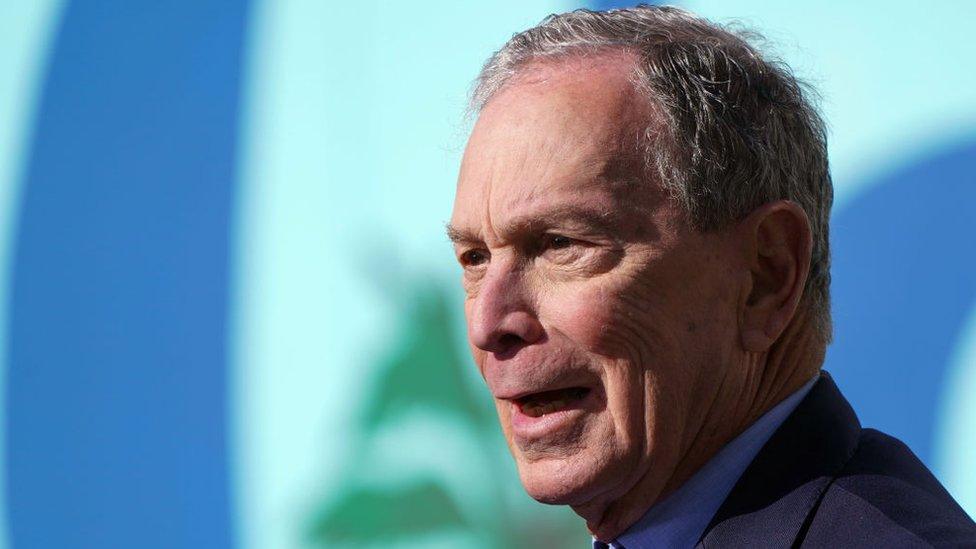
He's one of the richest men in the world, a polarising candidate in a crowded race and he's about to make his first appearance on the debate stage after rising to second place in the polls. So who are Mike Bloomberg's supporters, and why have they backed him?
Recent polling by NPR/PBS/Marist puts Mr Bloomberg in second place, behind Bernie Sanders, with 19% of the Democratic vote.
Mr Bloomberg will no doubt face questions on his political past - including recently revealed comments on women, farmers and minorities - on Wednesday, when he takes to the debate stage for the first time in Las Vegas, Nevada.
He won't appear on any ballots, however, until Super Tuesday - 3 March, when some of the biggest states, like California and Texas, hold their primary contests.
While liberals have attacked him over controversial policies during his tenure as mayor, his billionaire status and for having switched party affiliations in the past, Mr Bloomberg has also been a strong investor in many key causes for Democratic voters.
He spent some $100m (£77m) backing Democrats in the 2018 mid-term elections, which saw a record number of women voted to Congress. He founded the nonprofit Everytown for Gun Safety group to lobby for gun control policies. He has given more than $1bn to public health causes and over $278m to climate change initiatives.
Think of a Bernie Sanders supporter and there's a good chance an image pops into your mind of someone young, progressive, possibly male.
But what does a Michael Bloomberg fan look like?
Looking at polling data and anecdotally at rallies, it appears most of Mr Bloomberg's grassroots supporters skew older. Pro-Bloomberg groups on social media are run by older-than-middle-aged Americans; there may be some racial diversity, but little when it comes to age.
A Quinnipiac poll last week found most of the former mayor's support came from voters aged 50 and up who make over $50,000 a year.
Here's how Mr Bloomberg's grassroots supporters responded to some of the biggest criticisms against him - and why they say they are all in for Mike 2020.

What about the money?
For New Yorker Laura Wagner, Mr Bloomberg's money is far from a downside.
"You have to be a billionaire [to run] and then when you are, you're criticised for it!" she says, noting how much campaigns must fundraise and that most modern US presidents have been very wealthy.
Ms Wagner, a Sotheby's realty associate and contributing columnist to the Italian and English newspaper La Voce in her 50s, agrees the money plays a big factor in Mr Bloomberg's candidacy. But that, she says, is not a bad thing.
"All the power to him because he's using it, in my opinion, so effectively. He's not going to be bartering with these big oil companies and organisations, the NRA [National Rifle Association], or trying to appease.
"Donald Trump would like to be what Michael Bloomberg is in terms of the power, the money."
All of the supporters who spoke to the BBC echoed that Mr Bloomberg's successful business record was a highlight, not a hindrance.
"And being the mayor of New York City for three terms is pretty close to being president of the United States," Ms Wagner adds.
What about 'stop and frisk'?
Perhaps the biggest issue from Mr Bloomberg's mayoral past is this policy, which allowed police to question and search individuals for weapons or illegal items. Most people stopped were innocent; most were black or Latino.
"Stop, question and frisk" pre-dated Mr Bloomberg but peaked during his tenure, with around five million stops over a decade. Analysis of the programme in the years since has suggested the random investigative stops did not have a meaningful impact on crime.
In 2013, a federal judge ruled the tactic was unconstitutional, violating the rights of minority residents.
This month, audio emerged from 2015 where Mr Bloomberg claimed male minorities perpetrate "the real crime". He's since apologised for the policy and "the impact it had on black and Latino communities".
Sheikh Musa Drammeh, 58, is a religious leader and community activist who has lived in the Bronx and Harlem neighbourhoods of New York City for the last 30 years.
When asked about the controversial policy, Mr Drammeh emphasised: "No candidate will ever do as much for the blacks and Latinos as Bloomberg."
"I am black," Mr Drammeh continues. "Nobody can tell me about the ravages of crime in this city - I know it, I live it, I'm a victim of it.
"And Bloomberg did not create stop and frisk, [but] Bloomberg's administration saw that you must have a habitable environment otherwise investors, residents, high-earning individuals who will pay taxes to support social services, will leave the city."
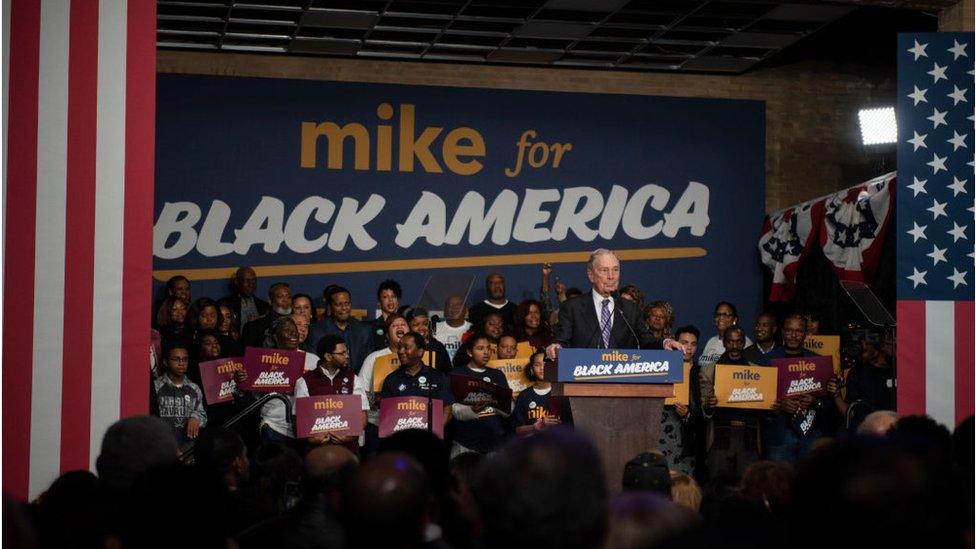
Mr Drammeh says from what he has seen as an activist working to stop gang violence, people in his neighbourhoods have "benefitted from stop and frisk".
"It's not discriminatory, it's life saving. The lives that are being saved are black and brown, not white."
What makes him the best to take on Trump?
Carla Shead, a 49-year-old from Maryland, told the BBC: "It'll take another New Yorker to beat Trump."
Ms Shead adds that Mr Bloomberg has proven himself by being "a successful businessman and a successful mayor" and "has put his money where his mouth is".
"When I started listening to his ads and what he had to say about building the community and what his plan was to do for the United States - he is everything Trump isn't. And that to me, is the bottom line."
Bloomberg: "We cannot afford four more years"
Ms Shead says that the divides in this country have been around for a long time. Her family is from Mississippi, she says, and many were active participants in the US civil rights movement.
"America is looking for a saviour right now," she says. "Trump from the beginning has split the nation and has dredged up old wounds.
"My family and other African-American families - are vested in this - in seeing the country coming together and I think Mike Bloomberg is doing the exact opposite of what Trump is doing."

What are Bloomberg's key campaign issues?
Ban assault-style weapons and implement better background checks for gun purchases
Tuition-free two-year public college, debt-free four-year college for lowest income students
Cutting greenhouse gas emissions 50% by 2030
Create public health insurance option while expanding enrolment in Obamacare plans
New 5% wealth tax on annual incomes of over $5m

What about his comments on women?
Mr Bloomberg has come under fire for sexist comments he allegedly made in 1990, including reportedly telling a pregnant employee she should "kill it", which he has denied under oath. The remarks have prompted comparisons to President Donald Trump.
But Darryl Morin, 52, told the BBC that he does not see any similarities between these allegations of sexism.
"I hear a lot of hearsay," he says. "I know there's been inflammatory rhetoric but I haven't seen any smoking gun like we did with Donald Trump."
"Just seeing everything he's done to help people around him, people of colour, women - I take him at him at his word," Mr Morin says, adding that Mr Bloomberg has elevated women within his organisation.
"Anybody who tries to say he's trying to hold minorities down, I'd argue vigorously he's done the opposite."
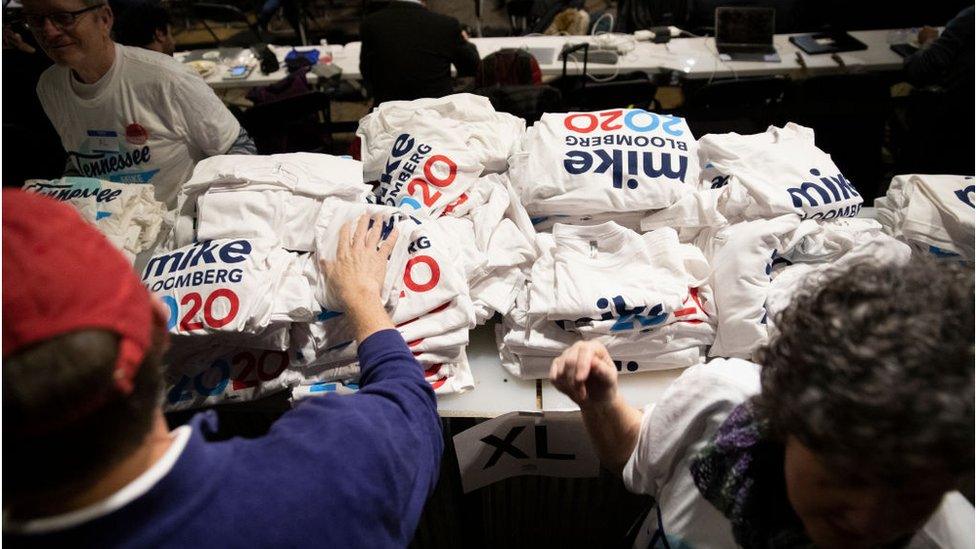
Mr Morin, who lives in Franklin, Wisconsin, has also attended a number of rallies this election cycle and says while Mr Bloomberg has work to do when it comes to younger voters, he draws a generally diverse crowd.
"I'm Hispanic, there's Asian Americans, African Americans, non-minorities. It really is a more thoughtful crowd rather than just supporting a person or idea."
He says the rallies have been respectful and that the former mayor answers questions about policies and his past in an upfront way.
"Once people see that, they realise that this is a man that really has spent the latter parts of his life trying to help everyone have equal access to that American dream."
What about his electability?
Despite his ad buys with Instagram influencers to target younger audiences, Mr Bloomberg's biggest support base still stems from an older crowd.
But Joe Nicoletti, 53, who helps manage pro-Bloomberg groups on Facebook, says "that's what campaigns are for. Telling your story and widening your tent."
Mr Nicoletti, who lives in Sandy Hook, Connecticut, told the BBC he liked "the fact that [Bloomberg] has been both a Republican and Democrat". And the former mayor's views, he added, are moderate, and "more in line with the majority of the country".
According to a February Pew Research Center analysis, external of the candidates' supporters, Mr Bloomberg's base is much less liberal than his 2020 rivals.
Only 29% describe themselves as liberal with the majority saying they are moderate or conservative. In this vein, 79% of Mr Bloomberg's base say they want a candidate who will work with Republicans and compromise on policies if need be.
"There's a reason why Donald Trump and Donald Trump supporters want to face Bernie Sanders in the general election," Mr Nicoletti says. "Pete Buttigieg is an impressive candidate, but Mike despite the stop and frisk issue has much broader support with people of colour."
He adds that some of the criticism levied at Mr Bloomberg is "hypocritical".
"When Mike Bloomberg used his money to help flip the house, elect more women candidates, push gun control legislation, and help flip the Virginia house, I don't remember hearing them complain."

Who will take on Trump in 2020?

- Published4 March 2020
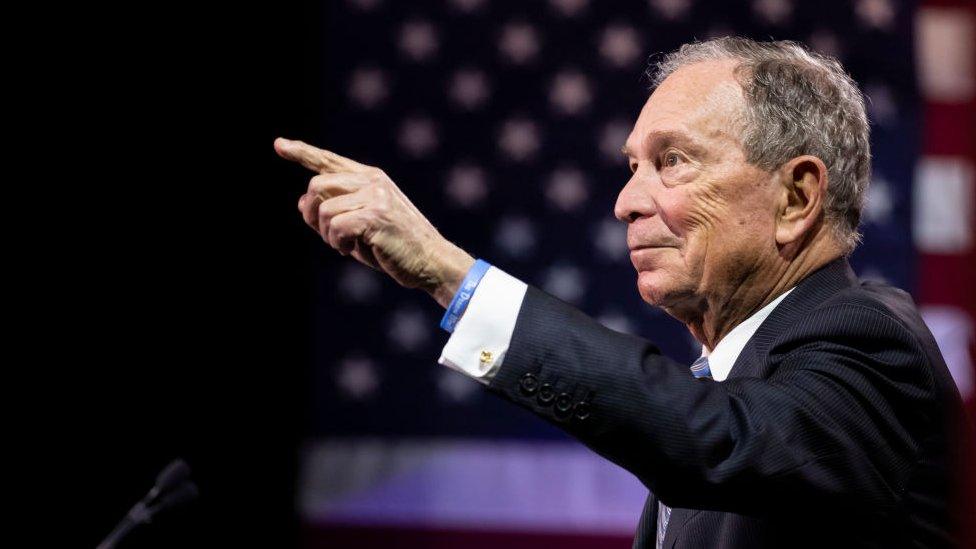
- Published2 March 2020
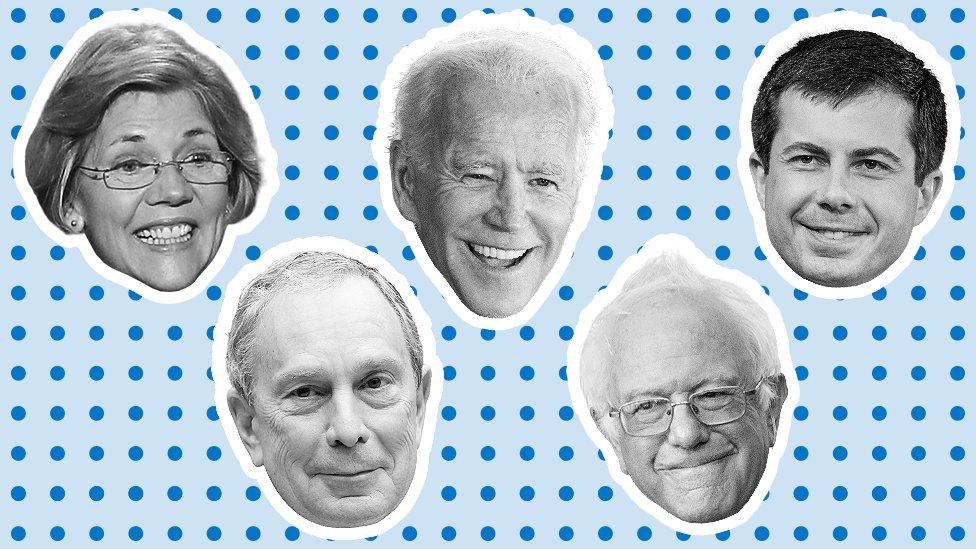
- Published13 February 2020
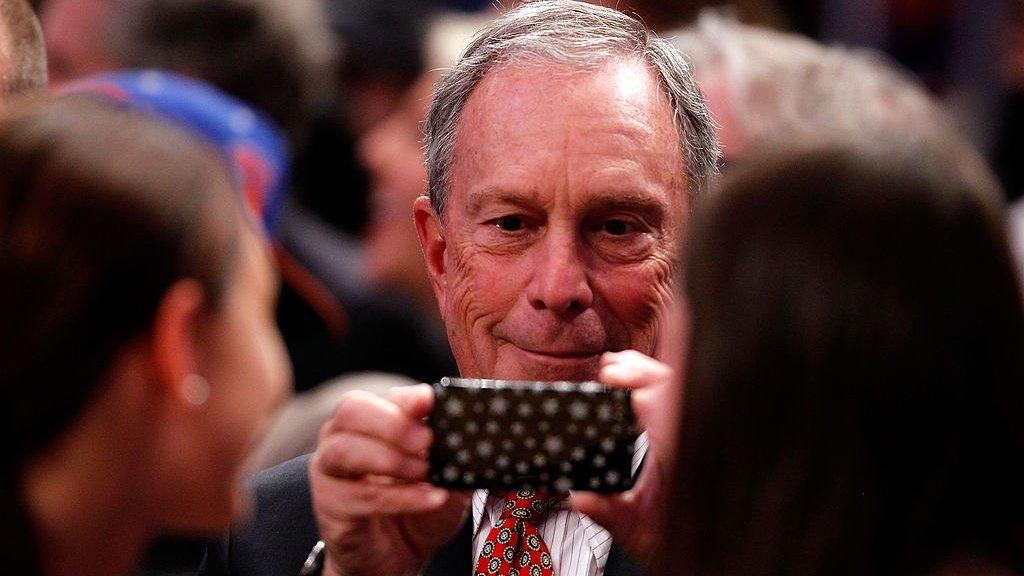
- Published8 November 2019